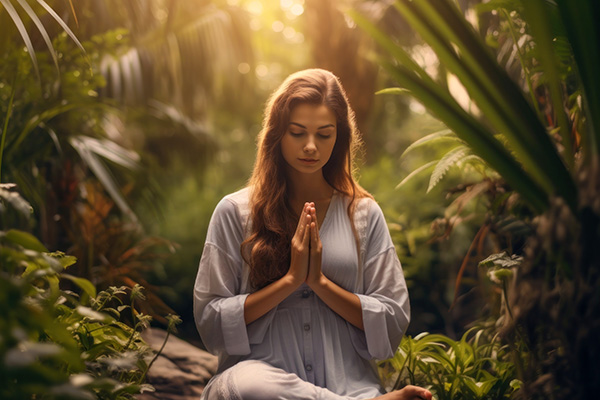inner guidance
The Power Of Creativity To Transform And Heal
 Creative play is a crack, or a doorway into another part of ourselves… into our intuitive and spiritual nature. To explore our creativity is to open that door of possibility.
Creative play is a crack, or a doorway into another part of ourselves… into our intuitive and spiritual nature. To explore our creativity is to open that door of possibility.
It is easy to doubt our creativity when we compare ourselves to others, and to great artists of the past. Through their life stories and work, the master artists left reminders, showing us that creativity is not something we are taught, but rather something we are. Tapping into this is about experiencing this for ourselves, in whatever form that may be.
I took up painting as a hobby in my late 20s. It began as a desire to learn to paint, although I held the belief that I wasn’t really creative, given my Finance and Accounting background. I had never considered Art to be healing, or that it held personal healing benefits.
At the beginning of my journey, I immersed myself in art books and read about other artists. I also joined a local art group. In class one day, I felt inspired to paint the Buddha. From the moment I picked up my brush to paint him, I could feel a presence by my side and I could see in the blank canvas the face that was to appear, long before it was visible to anyone else. That painting is the piece that changed the direction of my life path, as I embraced my creative and spiritual gifts.
Turning up to a blank canvas, is like saying yes to life and the unknown of what lays on our path. And there are many benefits of saying ‘yes’ to painting. Painting allows us to express ourselves through our work, it allows us a time and space to reflect on our life and the meaning we attached to our experiences.
Walking In Faith Through Life’s Ups And Downs
 Most of us go through life like it is a roller coaster ride. We have our ups and downs, our good days and our hard ones. Sometimes we catch ourselves saying things we probably shouldn’t, or reaching for that chocolate chip cookie even though we promised ourselves we wouldn’t.
Most of us go through life like it is a roller coaster ride. We have our ups and downs, our good days and our hard ones. Sometimes we catch ourselves saying things we probably shouldn’t, or reaching for that chocolate chip cookie even though we promised ourselves we wouldn’t.
Temptation is everywhere. That little voice in our head tells us to go for it, even when our gut or intuition says it’s not a good idea. It can leave us feeling torn and unsure of what the right choice really is.
And then, on top of all our personal ups and downs, there’s everything going on in the world around us. Lately, it feels like we’re living through constant upheaval: wars, natural disasters, political division, economic stress, runaway technology, and so much uncertainty about the future. All of it adds to the pressure we already carry.
It’s no wonder we feel overwhelmed or tempted to numb ourselves with distractions. When everything feels unstable, it’s easy to lose our sense of direction or forget the spiritual tools that keep us grounded.
That’s why staying connected to faith, however that looks for you, is more important than ever. It becomes an anchor in the storm, something solid to hold onto when everything else feels like it’s shifting.
Faith helps us pause, speak with care, and make better choices. It gives us insight and direction. When we turn away from it or get stuck in negative thinking, that’s usually when life starts feeling harder and more complicated.
Your Spirit Guides Will Never Lead You Astray
 “My guides must hate me! Why else would they lead me to things that cause me so much pain?” someone once said during a reading. “And where is my guardian angel when I need him?”
“My guides must hate me! Why else would they lead me to things that cause me so much pain?” someone once said during a reading. “And where is my guardian angel when I need him?”
It was not the first time I’ve heard such sentiments from a distressed client. This kind of disappointment and frustration is not uncommon because it cuts to the heart of spiritual seeking.
It is certainly a valid concern. If angels, guides, and ancestors are meant to guide, support, and protect us, then why do they sometimes lead us to pain, heartache, and even trauma? Do they really have our backs, or are they inflicting suffering upon us for some strange reason?
I confess that there was a time in my own life when I also asked these kinds of questions.
But after years of working as a professional psychic and energy healer, as well as through my own spiritual growth journey, I’ve since come to a comforting conclusion. Our spirit helpers always operate from a place of divine wisdom, unconditional love and compassionate support.
Then why, you may ask, do bad things sometimes happen to good people? It’s simple, really. Any detour from our highest good does not occur because spirit somehow miscalculated, neglected, or misrepresented anything.
When we encounter trouble, it is usually our own doing, or something we co-created with others. Whatever the reason or cause, we alone are always the common denominator.
Below are a few examples of such self-inflicted calamities that I have repeatedly come across in my work, as well as how they differ from actual spirit guidance and divine intervention.
Love, Lust, Or Infatuation? How To Tell The Difference
 When you develop intense feelings for someone, it can be hard to tell if you’re experiencing lust, infatuation, or the beginning of genuine, lasting love. All three feelings can be powerful and overwhelming, but they are very different.
When you develop intense feelings for someone, it can be hard to tell if you’re experiencing lust, infatuation, or the beginning of genuine, lasting love. All three feelings can be powerful and overwhelming, but they are very different.
These energies often manifest similarly at first: your heart races, you get butterflies, you can’t eat or sleep, and you find yourself daydreaming constantly. Not to mention the dizzy excitement you feel when you see his name pop up on your phone!
However, love, lust, and infatuation are not the same from a physical, mental, emotional, and spiritual perspective.
Infatuation can hit like lightning. One day, you’re going about your life, and the next, someone catches your eye. Suddenly, you can’t stop thinking about them. It feels exciting — like something big is happening, like fate.
Infatuation is highly emotional, and if left unchecked, it can become an unhealthy obsession with someone. You idealize them and ignore their flaws. Although it can feel a lot like love, it lacks depth and stability.
It’s easy to get caught up in the rush. But that high doesn’t always last. Infatuation can fade as quickly as it began, especially when you start to see the real person behind the sparkly image.
Often, infatuation appears when we’re in a state of desperation. Maybe we’re feeling lonely or want to be loved so badly that we project all our hopes onto someone else. We might think, “This person will complete me,” or “Everything will be better once we’re together.”


